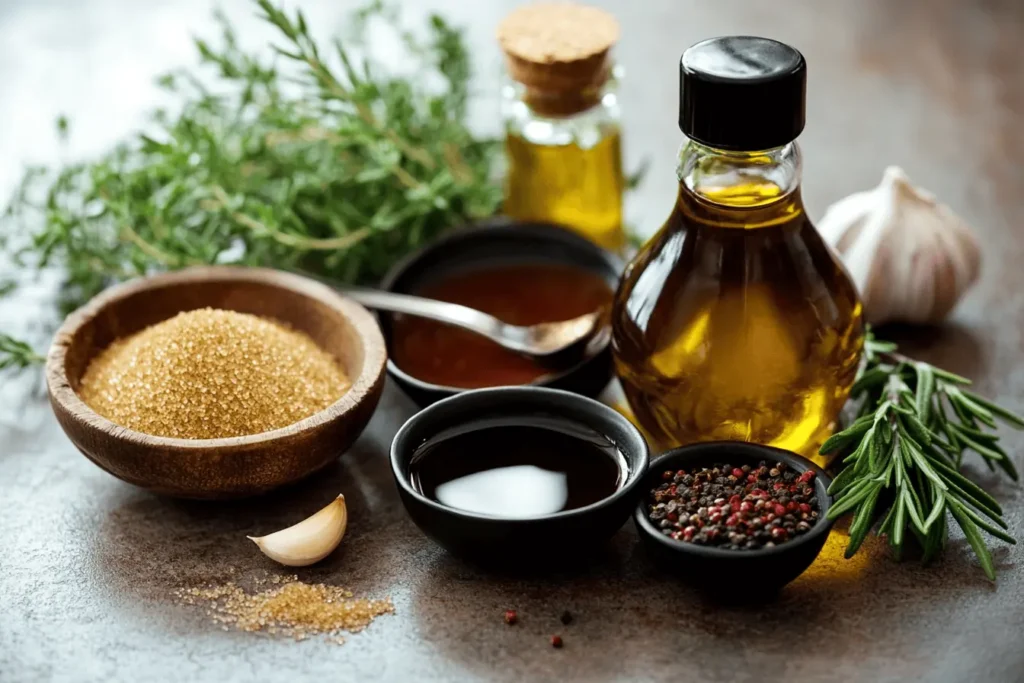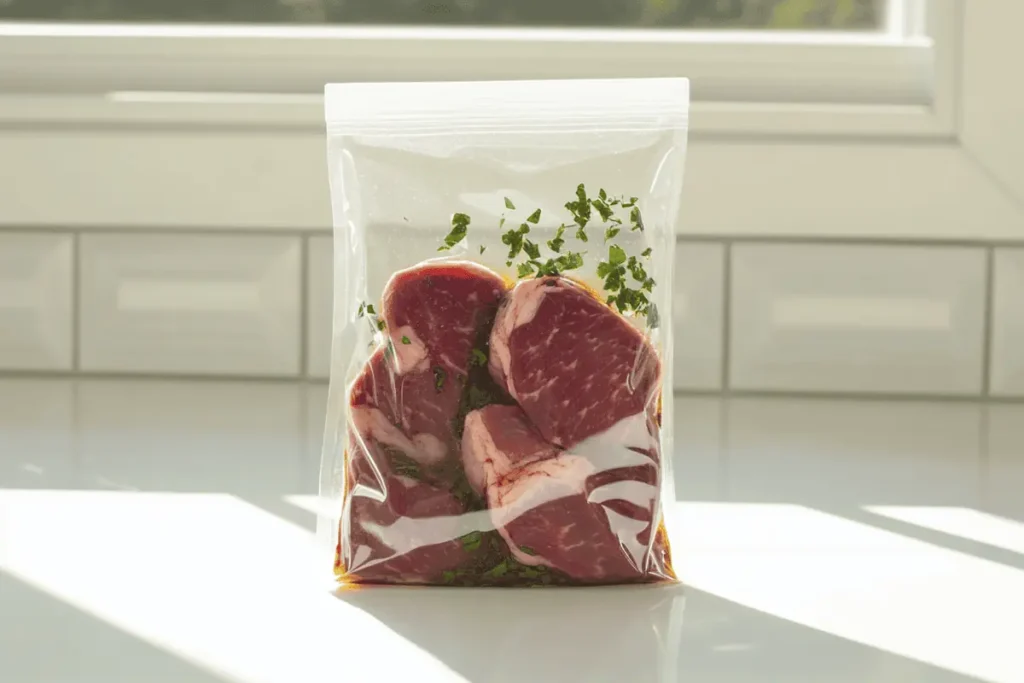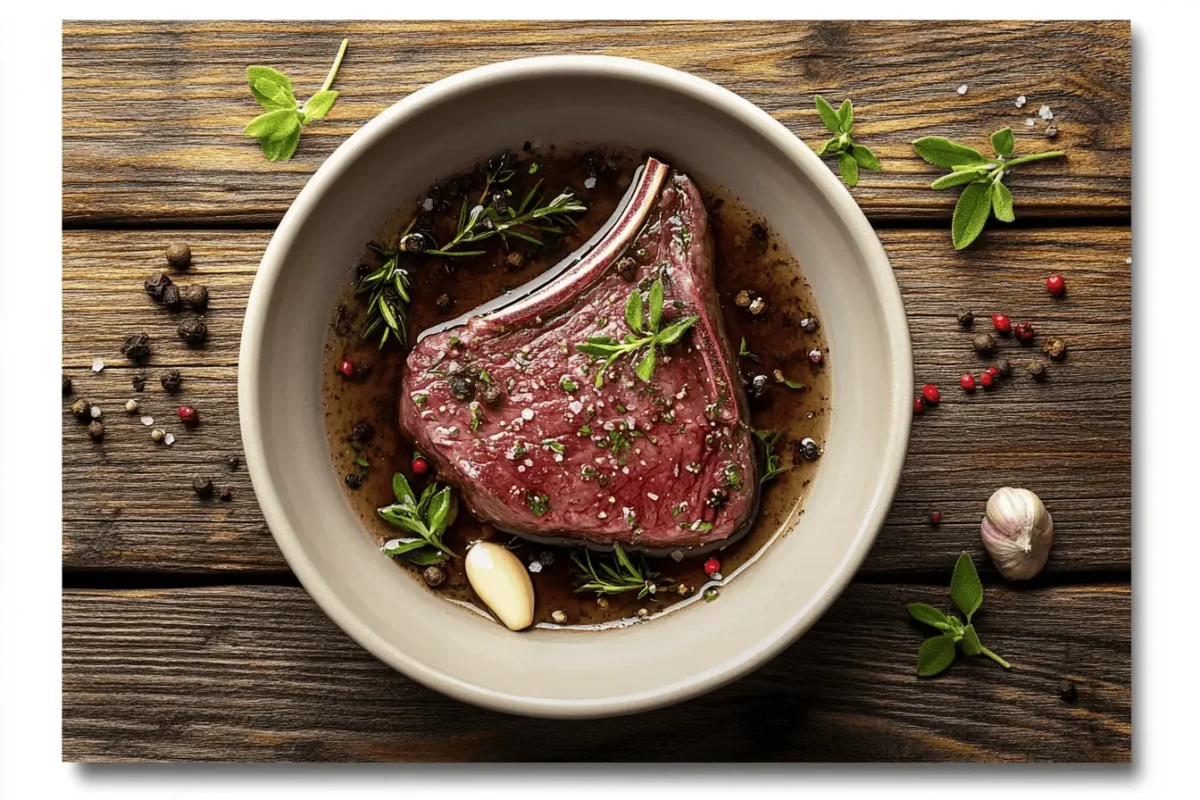When it comes to cooking wild game, a well-crafted venison marinade transforms a lean, gamey cut into a tender and flavorful masterpiece. This time-honored technique softens muscle fibers, boosts natural juices, and introduces vibrant notes that complement the deep taste of venison. In addition, a carefully chosen blend of seasonings and liquids helps remove that sometimes-intense aroma, resulting in a dish even the most skeptical guests will enjoy.
In the United States, many hunters value venison as a prized treasure. Yet, some home cooks shy away from preparing it. Often, they fear the strong flavors or worry about dryness. However, with a proper venison marinade, you can elevate the meat’s texture and taste. Proper preparation and marinating can ensure a safer and more pleasant eating experience. In addition, understanding the science of how marinades work helps you approach the kitchen with confidence.
For inspiration on managing flavor profiles and cooking wild game, many experts emphasize practical strategies. When you combine these resources with a well-balanced venison marinade, you set the stage for an unforgettable meal. Moreover, the right approach involves not only the marinade itself but also how to handle the meat before and after soaking.
Table of Contents
Understanding the Basics of Venison Meat and Flavor Profiles
What is Venison and Why is it Unique?
Venison refers to the meat from deer and related game, often harvested during hunting season. In the U.S., the most common source is whitetail deer, though other species are also popular. Venison is lean and nutritious, containing fewer calories and less fat than many traditional meats. However, its lean nature also means it can dry out if not prepared correctly.
In addition, venison’s flavor varies depending on the animal’s diet, age, and region. For example, deer that feed on acorns can yield richer and earthier meat. Therefore, choosing a marinade that complements these nuanced flavors allows you to amplify the natural taste rather than mask it. By embracing the unique profile of venison, you can craft a venison marinade that celebrates its wild heritage.
Why a Venison Marinade is Essential
The biggest challenge when cooking venison is dryness and toughness. In addition, some cuts may carry a strong, mineral-like taste that not everyone finds appealing. Consequently, a proper marinade helps break down tough fibers. This process tenderizes the meat and balances out bold flavors.
For example, acidic ingredients like vinegar, citrus juice, or wine help to soften the meat. Meanwhile, aromatic herbs and spices improve depth. Therefore, taking time to marinate ensures your finished dish is succulent, aromatic, and full of character. In short, the venison marinade becomes a reliable tool that boosts tenderness and taste, turning even the simplest recipe into a memorable feast.

Key Components of the Perfect Venison Marinade Recipe
The Role of Acids in a Venison Marinade
Acids break down proteins and help tenderize tough venison fibers. In addition, they introduce brightness and liveliness to the flavor. Common acidic ingredients include:
- Vinegars (apple cider, red wine, balsamic)
- Citrus juices (lemon, lime, orange)
- Wine or beer
For example, a splash of red wine vinegar not only softens the meat but also adds subtle fruitiness. Moreover, balancing acidity is essential, as too much acid can make the meat mushy. Therefore, start with mild amounts and adjust as you gain experience.
Aromatics and Herbs for an Exceptional Venison Marinade
Aromatics and herbs are the soul of any venison marinade. In addition, they contribute complexity and fragrance. Popular choices include:
- Garlic and onion
- Rosemary, thyme, and sage
- Bay leaves and juniper berries
For example, fresh rosemary pairs beautifully with venison, imparting a piney note that complements the earthy flavor. Similarly, a few cloves of smashed garlic release pungent compounds that penetrate the meat. Therefore, a blend of herbs and aromatics ensures your marinade offers a layered and satisfying profile.
Salts and Umami Enhancers for Wild Game Marinades
Salt enhances natural flavors and helps the marinade penetrate deeper. In addition, seasonings like soy sauce or Worcestershire sauce contribute savory umami notes. Together, salt and umami work to round out flavors without overwhelming them. For example, a tablespoon of soy sauce can add depth and subtle sweetness. Similarly, a dash of Worcestershire sauce provides complexity that ties everything together. Therefore, consider adding a small amount of these savory elements to boost richness.
Sweet Elements to Balance your Venison Marinade
A hint of sweetness helps balance acids and bitterness. For example, a spoonful of brown sugar or maple syrup can smooth sharp edges and create a cohesive profile. Moreover, sweetness promotes caramelization when cooking. Therefore, consider adding a sweetener if your marinade tastes too sharp or flat. Remember to keep it minimal to avoid overpowering the natural venison essence.
The Importance of Oils in a Venison Marinade for Moisture and Flavor
Oils coat the meat’s surface and help retain moisture. In addition, oils can carry fat-soluble flavors into the meat’s crevices. Neutral oils like canola or grapeseed work well, but a robust extra-virgin olive oil can also shine. For example, a high-quality olive oil adds fruitiness and body, enhancing the marinade’s overall feel. Therefore, a small amount of oil can improve moisture retention and make the final dish juicier.
Crafting the Best Homemade Venison Marinade: Step-by-Step Guide
Step 1: Gather Essential Ingredients for Your Marinade Base
Before you start, ensure you have a balanced mixture. For a simple venison marinade, consider the following ratio:
- 1/2 cup acidity (red wine vinegar, lemon juice, or a mix)
- 1/4 cup savory sauce (Worcestershire, soy sauce, or fish sauce)
- 2 tablespoons sweetener (brown sugar, honey, or maple syrup)
- 2 tablespoons oil (olive or canola)
- Fresh herbs and spices to taste (rosemary, thyme, garlic)
This blueprint helps you create a marinade that is neither too sour nor too sweet. In addition, it encourages balance and complexity right from the start.
Step 2: Taste and Adjust Marinade Seasonings for Flavor
Taste the marinade before adding the venison. For example, if it feels too acidic, add a bit more sweetener. Conversely, if it’s too mild, add a dash of vinegar or a pinch of salt. Moreover, experimenting with different flavors can help you discover your personal favorite profile. Therefore, trust your palate and be willing to adapt as you gain experience.
Step 3: Select the Best Venison Cuts for Marinating
Not all cuts of venison are equal. In addition, leaner cuts like backstrap benefit greatly from marinating. More robust cuts, such as leg or shoulder, can also improve in tenderness and flavor. For example, a venison marinade can turn a tougher piece into a tender delight ready for grilling, roasting, or pan-searing.
Step 4: Properly Marinate Venison in the Refrigerator
Place your venison in a sealable bag and pour the marinade over it. In addition, remove as much air as possible before sealing. This helps the marinade contact the meat evenly. Turn the bag every few hours for even flavor distribution. Moreover, store it in the refrigerator to keep the meat safe from harmful bacteria. Therefore, patience is key. Let the marinade work its magic overnight for the best results.
Step 5: Prepare Venison for Cooking After Marination
Before cooking, remove the venison from the marinade and pat it dry. In addition, excessive moisture can hinder browning. For example, a dry surface helps form a rich crust, sealing in juices. Consequently, this step elevates the final texture and flavor of your dish.
Flavorful Marinade Variations for Cooking Venison
Classic Red Wine Herb Marinade for Venison
This traditional approach relies on red wine’s fruity acidity and robust herbs. For example:
- Red wine vinegar
- Dry red wine
- Garlic, rosemary, thyme
- Olive oil
- A pinch of brown sugar
In addition, a splash of Worcestershire sauce adds savory depth. Therefore, the result is a well-rounded, elegant flavor that pairs beautifully with roasted vegetables or mashed potatoes.
Bright Citrus and Cilantro Marinade for Venison Tacos
For a brighter, zesty profile, consider citrus and fresh herbs. For example:
- Lemon juice and zest
- Lime juice
- Cilantro, parsley, and green onion
- Light soy sauce
- Honey or agave syrup
In addition, this profile complements grilled venison tacos or fajitas. Therefore, it’s perfect if you prefer lighter, fresher flavors that celebrate the meat’s natural character.
Asian-Inspired Soy Ginger Marinade for Wild Game
If you seek an umami-rich kick, turn to soy and ginger. For example:
- Soy sauce
- Rice vinegar
- Fresh ginger and garlic
- Toasted sesame oil
- Brown sugar
In addition, a hint of five-spice powder adds complexity. Therefore, serve this marinated venison with stir-fried vegetables or over steamed rice for a fusion meal.
Smoky Chipotle and Spicy Marinade for Grilled Venison
For those who enjoy bold, smoky flavors and a touch of heat:
- Chipotle peppers in adobo
- Apple cider vinegar
- Maple syrup
- Smoked paprika, cumin, and garlic
- A dash of hot sauce
In addition, this profile works well for grilling or smoking venison. Therefore, it is ideal for barbecue-style meals and backyard gatherings.

Pro Tips for Marinating Venison to Perfection
Slicing Venison Against the Grain for Tender Results
After cooking the marinated venison, slicing against the grain yields more tender pieces. In addition, shorter muscle fibers mean less chewing. Therefore, always pay attention to the direction of the meat’s grain.
Best Cooking Methods for Marinated Venison Dishes
Certain cooking methods align well with marinated venison. For example, quick, high-heat methods like grilling or pan-searing work best for tender cuts. In addition, slow-braising tougher cuts after marinating infuses flavor while softening the meat. Therefore, choose a method that enhances your chosen flavor profile and the cut’s texture.
Resting Marinated Venison for Maximum Juiciness
Allowing the venison to rest for a few minutes after cooking helps redistribute juices. In addition, resting ensures each bite remains moist and flavorful. Therefore, resist the urge to cut into the meat immediately. A brief rest can mean the difference between a dry meal and a succulent feast.
Ideal Marination Time for Venison Cuts
How long you marinate depends on the cut and intensity of your marinade. For example, a few hours may be enough for thin steaks with a strong marinade. In addition, overnight marinating often yields the best results for thicker cuts. However, avoid marinating for days, as overly long times can break down proteins too much. Therefore, strike a balance that suits your taste and schedule.
Pairing Marinated Venison with Sides and Drinks
Hearty Grilled Vegetables and Roasted Potatoes with Venison
A hearty venison marinade pairs well with simple sides like grilled zucchini, bell peppers, and mushrooms. In addition, roasted potatoes or sweet potatoes complement the meat’s richness. Therefore, keep sides straightforward to let the venison shine.
Elegant Creamy Polenta or Risotto for Venison Dinners
If you prefer a more refined presentation, serve marinated venison slices over creamy polenta or a mushroom risotto. In addition, the richness of these starches harmonizes with the savory notes of the marinade. Therefore, each bite provides a balanced experience, luxurious yet comforting.
Fresh Crisp Salads to Complement a Rich Venison Marinade
A fresh salad provides a refreshing contrast. For example, a simple mix of greens, cherry tomatoes, and a light vinaigrette balances the richness of the meat. In addition, adding seasonal fruits or nuts brings texture and brightness. Therefore, consider a side salad to elevate your meal’s complexity.
Wine and Beverage Pairings for Marinated Wild Game
Consider pairing your marinated venison with a bold red wine like Cabernet Sauvignon or Malbec. In addition, a craft beer with caramel notes can complement smoky marinades. Therefore, the right beverage can enhance flavors and turn a great meal into a memorable culinary event.
Conclusion
A well-prepared venison marinade can transform a simple piece of wild game into a culinary delight. In addition, by understanding the roles of acidity, aromatics, sweetness, and savory depth, you can craft a marinade that perfectly suits your taste. Moreover, experimenting with different flavor profiles, adjusting marinating times, and choosing the right sides and beverages ensure a complete dining experience.
With careful preparation, patience, and creativity, you can celebrate the unique flavors of venison while appealing to a wide range of palates. Therefore, embrace the artistry of marination, and let your next venison feast become a memorable highlight of your kitchen adventures.
Frequently Asked Questions
What’s the Best Venison Marinade for Flavor and Tenderness?
The best thing to marinate venison in is a balanced mix of acids, aromatics, and seasonings. In addition, red wine vinegar, fresh herbs, and a touch of sweetness create a reliable base. Therefore, consider combining vinegar, olive oil, garlic, rosemary, and a bit of brown sugar for an all-purpose venison marinade.
How to Prepare Venison with Saltwater or Brine Before Marinating?
Many home cooks prefer soaking deer meat in a mild saltwater brine before marinating. In addition, a saltwater solution can draw out blood and reduce strong flavors. Therefore, this initial soak makes the final marinade more effective, leading to tender and well-balanced meat.
How Long to Marinate Venison for Best Results?
Most cuts benefit from marinating between four and 24 hours. In addition, marinating overnight often provides optimal tenderness and flavor. However, avoid exceeding 48 hours. Therefore, too much time can break down the meat’s structure and result in a mushy texture.
What Spices and Herbs Work Best for Venison Marinades?
Seasonings that complement venison include earthy herbs like rosemary and thyme. In addition, juniper berries, bay leaves, garlic, and shallots enhance its rich flavor. Moreover, a bit of sweetness from brown sugar or maple syrup adds balance. Therefore, focus on herbs and spices that highlight, rather than overpower, the meat’s natural character.

